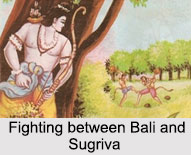 Bali was a demon king, who was the grandson of Prahlad and a great devotee of Lord Vishnu. Bali was also known as "Mahabali" in Ramayana and was about to cause chaos on the earth. Bali was a greedy king but on the other hand he was a great philanthropist. Bali was a great Demon king who had triumphed over the heaven. He captured all the beautiful women for his pleasure and thus caused panic in the earth. Bali was the husband of Tara.
Bali was a demon king, who was the grandson of Prahlad and a great devotee of Lord Vishnu. Bali was also known as "Mahabali" in Ramayana and was about to cause chaos on the earth. Bali was a greedy king but on the other hand he was a great philanthropist. Bali was a great Demon king who had triumphed over the heaven. He captured all the beautiful women for his pleasure and thus caused panic in the earth. Bali was the husband of Tara.
Legends of Bali
As one myth goes, Bali was very courageous. When Tara tried to stop him and begged him not to fight with Sugriva, by saying that it was God who was helping Sugriva and had come to set free Sugriva. Then Bali replied to Tara that even if he was fighting in opposition to God, he could not close the eyes to a challenge for a fight and remains silence. Sugriva disputed Bali for a battle. When Bali sallied forth to meet the challenge, Lord Rama appeared from the woods to shoot and killed him with an arrow from the back of a tree. Then Bali told Lord Rama that if he was searching for his wife Sita, he should have come to him for help and companionship. Bali added whoever took Sita, be it Ravana himself, he would have conquered them and would have brought them to Lord Rama"s feet for his forgiveness. Bali asked three questions to Lord Rama. He asked Lord Rama that what his crime was. He told Lord Rama that Sugriva made his wife a widow and stole his empire. He asked Lord Rama what his right to kill him was. He could have helped Lord Rama in getting Sita as king Dasharatha helped his father King Indra to fight against the rakshasas.
Then Lord Rama said that the younger brother should be treated like a son. Even if he made a mistake he should forgive and forget. Lord Rama said he lost his kingdom while fighting with mayavi and he was no more a king, so he could not ask for his help. After death of Bali, Sugriva evoked his kingdom and regained his wife Ruma. Angada, son of Bali and his wife, Tara, was made Yuvraja.












